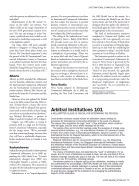 Cross-border contracts usually include an arbitration clause setting out provisions for international commercial arbitration in the event of a dispute. The clause often stipulates the legal “seat” of the arbitration, which country’s laws will apply, and the venue where hearings will be held.
Cross-border contracts usually include an arbitration clause setting out provisions for international commercial arbitration in the event of a dispute. The clause often stipulates the legal “seat” of the arbitration, which country’s laws will apply, and the venue where hearings will be held.The parties often opt to hold the hearings under the auspices of a large, experienced arbitral institution, e.g., the International Chamber of Commerce, based in Paris; the London Court of International Arbitration, based in London; or the International Centre for Dispute Resolution, which is the international arm of the American Arbitration Association.
Regional institutions also do cross-border arbitration, e.g., the Hong Kong International Arbitration Centre, the Singapore International Arbitration Centre, the Arbitration Institute of the Stockholm Chamber of Commerce, Ontario-based Arbitration Place and Vancouver-based British Columbia International Commercial Arbitration Centre.
The choice of institution does not determine the “seat” of arbitration. For example, the ICC Court of Arbitration is based in Paris, but only one-third of ICC arbitration hearings actually take place in that city. The rest are held at ICC-related venues in over 60 countries, including Canada.
Sometimes parties to a dispute opt for ad hoc arbitration, meaning no institution administers the proceedings. UNCITRAL Model Law rules are usually used for disputes where no arbitral institution is involved. Most of the international commercial arbitration conducted in Canada is ad hoc, as the parties prefer to avoid the fees charged by the institutions for managing the administrative aspects of the arbitration.




